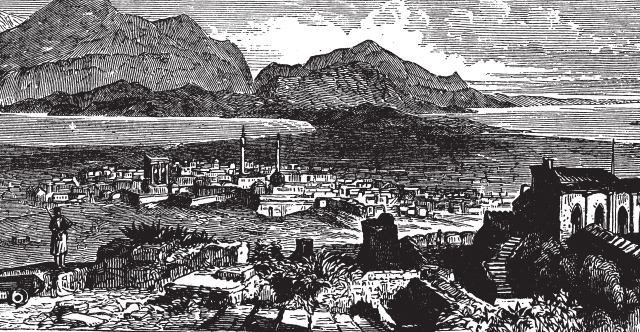
1
N
ow concerning things offered to idols: We know that we all have knowledge. Knowledge puffs up, but love edifies.
En cuanto a lo sacrificado a los ídolos, sabemos que todos tenemos conocimiento. El conocimiento envanece, pero el amor edifica.
2
A
nd if anyone thinks that he knows anything, he knows nothing yet as he ought to know.
Si alguien cree que sabe algo, no ha aprendido todavía como debe saber;
3
B
ut if anyone loves God, this one is known by Him.
pero si alguien ama a Dios, ése es conocido por El.
4
T
herefore concerning the eating of things offered to idols, we know that an idol is nothing in the world, and that there is no other God but one.
Por tanto, en cuanto a comer de lo sacrificado a los ídolos, sabemos que un ídolo no es nada (no tiene verdadera existencia) en el mundo, y que no hay sino un solo Dios.
5
F
or even if there are so-called gods, whether in heaven or on earth (as there are many gods and many lords),
Porque aunque haya algunos llamados dioses, ya sea en el cielo o en la tierra, como por cierto hay muchos dioses y muchos señores,
6
y
et for us there is one God, the Father, of whom are all things, and we for Him; and one Lord Jesus Christ, through whom are all things, and through whom we live.
pero para nosotros hay un solo Dios, el Padre, de quien proceden todas las cosas y nosotros somos para El; y un solo Señor, Jesucristo, por quien son todas las cosas y por medio de El existimos nosotros.
7
H
owever, there is not in everyone that knowledge; for some, with consciousness of the idol, until now eat it as a thing offered to an idol; and their conscience, being weak, is defiled.
Sin embargo, no todos tienen este conocimiento. Porque algunos, estando acostumbrados al ídolo hasta ahora, comen alimento como si éste fuera sacrificado a un ídolo, y su conciencia, siendo débil, se mancha.
8
B
ut food does not commend us to God; for neither if we eat are we the better, nor if we do not eat are we the worse.
Pero la comida no nos recomendará a Dios, pues ni somos menos si no comemos, ni somos más si comemos.
9
B
ut beware lest somehow this liberty of yours become a stumbling block to those who are weak.
Pero tengan cuidado, no sea que esta libertad (este derecho) de ustedes de alguna manera se convierta en piedra de tropiezo para el débil.
10
F
or if anyone sees you who have knowledge eating in an idol’s temple, will not the conscience of him who is weak be emboldened to eat those things offered to idols?
Porque si alguien te ve a ti, que tienes conocimiento, sentado a la mesa en un templo de ídolos, ¿no será estimulada su conciencia, si él es débil, a comer lo sacrificado a los ídolos ?
11
A
nd because of your knowledge shall the weak brother perish, for whom Christ died?
Por tu conocimiento se perderá el que es débil, el hermano por quien Cristo murió.
12
B
ut when you thus sin against the brethren, and wound their weak conscience, you sin against Christ.
Y así, al pecar contra los hermanos y herir su conciencia cuando ésta es débil, pecan contra Cristo.
13
T
herefore, if food makes my brother stumble, I will never again eat meat, lest I make my brother stumble.
Por tanto, si la comida hace que mi hermano caiga en pecado, no comeré carne jamás, para no hacer pecar a mi hermano.
 English
English
 Albanian - Shqip
Albanian - Shqip
 Arabic - العربية
Arabic - العربية
 Bulgarian - Български
Bulgarian - Български
 Chinese - 汉语
Chinese - 汉语
 English - English
English - English
 French - Français
French - Français
 German - Deutsch
German - Deutsch
 Italian - Italiano
Italian - Italiano
 Māori - Te Reo Māori
Māori - Te Reo Māori
 Portuguese - Português
Portuguese - Português
 Romanian - Română
Romanian - Română
 Russian - Русский
Russian - Русский
 Somali - Af Soomaali
Somali - Af Soomaali
 Spanish - Español
Spanish - Español
 Ukrainian - Українська
Ukrainian - Українська
 Vietnamese - Tiêng Viêt
Vietnamese - Tiêng Viêt
 Spanish
Spanish
 Albanian - Shqip
Albanian - Shqip
 Arabic - العربية
Arabic - العربية
 Bulgarian - Български
Bulgarian - Български
 Chinese - 汉语
Chinese - 汉语
 English - English
English - English
 French - Français
French - Français
 German - Deutsch
German - Deutsch
 Italian - Italiano
Italian - Italiano
 Māori - Te Reo Māori
Māori - Te Reo Māori
 Portuguese - Português
Portuguese - Português
 Romanian - Română
Romanian - Română
 Russian - Русский
Russian - Русский
 Somali - Af Soomaali
Somali - Af Soomaali
 Spanish - Español
Spanish - Español
 Ukrainian - Українська
Ukrainian - Українська
 Vietnamese - Tiêng Viêt
Vietnamese - Tiêng Viêt
